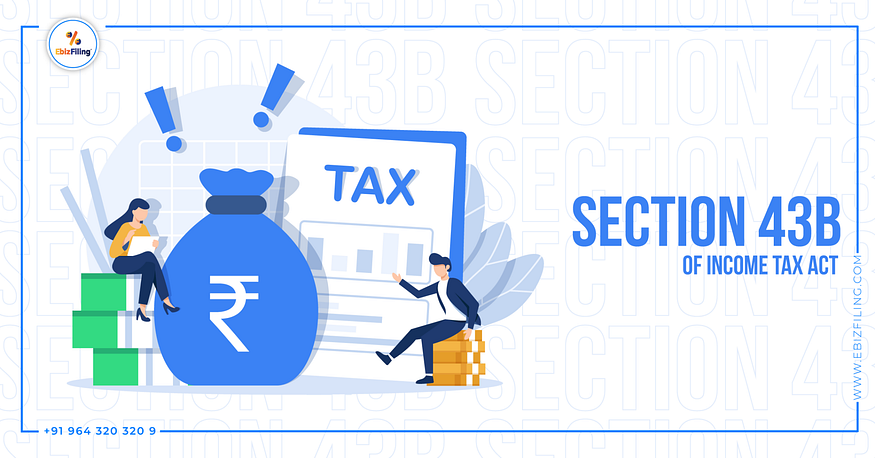What is Section 43B of the Income Tax Act?

Introduction
Section 43B of the Income Tax Act is an important provision which deals with various types of expenses allowed as deduction. It lays down the conditions for claiming deductions for certain expenses incurred by businesses and individuals. In this blog, we will take a closer look at Section 43B and understand its various aspects.
What is Section 43B of the Income Tax Act?
Section 43B of the Income Tax Act specifies certain expenses which are allowed as deduction, subject to certain conditions. These expenses include:
1. Statutory Dues: This includes payment for any tax, cess, duty or fee payable under any law as well as any contribution to any provident fund or other fund established for the welfare of employees.
2. Contribution of employees to PF and ESI: Contribution made by the employer to the employee provident fund or any other fund established for the welfare of the employees is allowed as deduction only if it is paid before the due date specified under the relevant law.
3. Bonuses and commissions: Any bonus or commission payable to employees is allowable as a deduction only if it is paid before the due date of filing the income tax return.
4. Leave encashment: Any payment made to an employee for leave encashment is allowed as a deduction only if it is made on or before the due date for filing the Income Tax return.
5. Interest on loans: Interest payable on any loan or borrowing taken for business purposes is allowed as a deduction only if it is actually paid before the due date of filing the income tax return.
What are the conditions for claiming deduction under section 43B?
To claim deduction under Section 43B, the following conditions must be satisfied:
1. Payment must be made before due date: Payment must be made on or before the due date specified under the relevant law. For example, the due date for payment of provident fund contributions is the 15th of every month.
2. Payment must be actually made: Payment must be actually made and not merely accrued or payable. For example, if an employer receives a bonus for an employee in a particular financial year but does not pay it until the next financial year, the bonus will not be allowed as a deduction in the first financial year.
3. Payment should be compulsory: Payment should be compulsory and not discretionary. For example, if an employer decides to pay a bonus to an employee, but it is not part of the employment contract, the bonus will not be allowed as a deduction.
4. Payment must be evidenced by a written document: Proof of payment must be shown by a written document such as cheque, bank draft or online transfer. Cash payments are not allowed as deduction under section 43B.
Effect of Section 43B on Tax Liability
Section 43B can have a significant impact on the tax liability of businesses and individuals. For example, if an employer fails to pay a provident fund contribution before the due date, it will not be allowed as deduction in that financial year. This will increase the taxable income of the employer and result in higher tax liability.
Similarly, if a person fails to pay the interest on the loan taken for business purposes before the due date, it will not be allowed as deduction in that financial year. This will increase the taxable income of the individual and result in higher tax liability. Therefore, it is important for businesses and individuals to ensure timely payment of expenses mentioned under Section 43B to avoid any adverse impact on their tax liability.
What are the Exceptions to section 43B of Income Tax?
Section 43B contains certain exceptions where the conditions mentioned above do not apply. These exceptions include:
- Wages paid as bonus or commission for services rendered to an employee, where if it had not been paid as bonus or commission, such wages would not have been payable to him as profit or dividend.
- Any wages paid by way of contribution by the employer to any recognized gratuity fund in accordance with the provisions of the Employees’ Provident Funds and Miscellaneous Provisions Act, 1952, where such wages are not paid.
- Any wages paid to an employee by way of contribution to any pension scheme, where such wages are not paid in accordance with the provisions of the Employees’ Provident Fund and Miscellaneous Provisions Act, 1952.
“Effortlessly file income tax return online with our user-friendly platform. Maximize refunds and comply with tax regulations seamlessly. Start today!”
Summary
It is important for taxpayers to understand the provisions of Section 43B and ensure timely payment of expenses specified thereunder to avoid any adverse impact on their tax liability. As a business or an individual, it is always advisable to consult a tax expert or a chartered accountant to understand the nuances of the Income Tax Act and ensure compliance with the provisions of Section 43B. Failure to comply with the provisions of Section 43B can result in fines and penalties, which can have a significant impact on your financial position.

Comments
Post a Comment